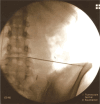EXPLORING THE FEASIBILITY OF PLATELET-RICH PLASMA INJECTIONS FOR INTERVERTEBRAL DISCOPATHY: A PILOT STUDY
- PMID: 39435456
- PMCID: PMC11492506
- DOI: 10.2340/jrm-cc.v7.18305
EXPLORING THE FEASIBILITY OF PLATELET-RICH PLASMA INJECTIONS FOR INTERVERTEBRAL DISCOPATHY: A PILOT STUDY
Abstract
Objective: This longitudinal pilot study aimed to evaluate the feasibility, safety and potential benefits of Platelet-Rich Plasma injections into the lumbar intervertebral discs in patients with low back pain and degenerative intervertebral monodiscopathy, assessing potential efficacy on disability.
Design: Longitudinal pilot study.
Methods: Six participants with chronic low back pain and lumbar degenerative intervertebral disc (monodiscopathy) disease underwent 1 Platelet-Rich Plasma injection, with a 1-year follow-up. Platelet-Rich Plasma injections were administered into the lumbar intervertebral disc, and outcomes were measured using the Roland Morris Disability Questionnaire, numeric rating scale for pain, Tampa scale for kinesiophobia and lumbar flexion range. Magnetic resonance imaging analysis assessed disc changes.
Results: No adverse events were reported. At the end of the 1-year follow-up, half of the patients showed significant improvements in disability scores at 1 year, while 3 of the 6 patients had no change. Magnetic resonance imaging revealed no significant disc changes.
Conclusion: Platelet-Rich Plasma injections show promise for some patients with low back pain and degenerative intervertebral discopathy patients. However, caution is warranted due to study limitations, including small sample size and lack of a control group. Further research is needed to define Platelet-Rich Plasma therapy protocols.
Keywords: back pain; case series; disability; disc degeneration; injection; platelet-rich plasma.
Plain language summary
This study investigated the feasibility, safety and potential benefits of Platelet-Rich Plasma injections for patients with back pain having a degenerative intervertebral monodiscopathy. Six participants received Platelet-Rich Plasma injections and were monitored for 1 year. We evaluated their pain levels, daily functioning, fear of movement and range of motion before the injection and at the 1-year follow-up, alongside magnetic resonance imaging scans to assess disc changes. Results showed that while half experienced improved daily functioning, the others showed no change. Magnetic resonance imaging scans revealed no significant disc changes. These findings underscore the need for further research, given the study’s small sample size and lack of a control group. Clarifying the benefits of Platelet-Rich Plasma therapy for degenerative discopathy-related low back pain requires additional investigation to establish definitive treatment guidelines.
© 2024 The Author(s).
Conflict of interest statement
The authors have no conflicts of interest to declare.
Figures
References
LinkOut - more resources
Full Text Sources



